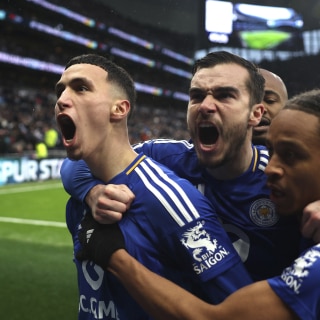Hello and welcome to the Premier Skills English podcast. This new series of Football English podcasts are based around the needs of football players and football fans and will present language you need to play the game, language you need to watch the game on TV and online and language you need to travel to the UK to see a match at a Premier League stadium.
Today, I am focusing on English for players and want to talk about some more advanced football English that you can use to talk about tactics. This language will be useful for players who want to understand tactical terminology and who want to be able to read and discuss match reports. In preparation for this episode, I’ve been looking through the talking tactics pages on PremierLeague.com, the official Premier League website and ... well, the language is not too complicated, but there are lots of advanced phrases and specialist football uses that might make the texts a bit of a challenge.
As well as the talking tactics pages on the Premier League website, I’ve been looking at match reports and some coaching blogs and I’ve made a list of five approaches to tactics. To tackle talking tactics, I’m going to talk about:
- Total football
- Tiki taka
- Counter attacking
The high press
And
- Fluid formations
Now, I was going to talk about all five and then describe the language. But, talking tactics is hard. In each of the descriptions, I’m using a lot of quite high level football English. So I’ve decided to turn talking tactics into a series of five shorter podcasts. I think there’s just too much to talk about in one episode so I’ll make them shorter and publish them more frequently.
Football phrase review
Before I get to the tactics, I want to quickly talk about last week’s football phrase and give you one more chance to guess.
Last week, the football phrase was ***. This describes a cheeky move in football that is generally known by a longer word and derives from a slang term that used to mean to trick someone or make someone look like a fool. In football, quite simply, it means to put the ball through the legs of an opponent. I have chosen this phrase because this shortened version has quite recently, I think, become the most common way to describe this act.
OK ... nobody got this one right. Only three people tried to guess and they were all on the right track, but nobody got it quite right. Thank Nicholas, Andre and Miguel for playing, it’s lovely to see your comments on the new website.
The answer was meg which is the new slang term meaning to kick the ball through the legs of an opponent. We used to use the word nutmeg, but now I think that the shortened version meg is more common.
Andre, you asked about some language from a match report. Specifically, the sentence: Their early pressure paid off in the 12th minute, when the midfielder capitalized on a loose ball at the edge of the box and rifled a stunning volley into the net, leaving the goalkeeper rooted to the spot.
The metaphors in match reports are often a bit puzzling, but in this sentence, the metaphorical sense has shifted to connotation as all of the meanings have been formalised and can be found in the dictionary.
So you asked about the verb to capitalise, which you’re right, means the same as to profit from something or to take advantage of a situation.
And next you asked about ‘rifled’. Sports journalists do like to use metaphors related to weapons and this usage is common enough that there is an entry in the dictionary for the verb to rifle meaning to kick a ball hard and straight.
Lastly, you are correct about the verb rooted. though I think that it’s almost always used in the phrase rooted to the spot; meaning unable to move, usually because you are shocked or scared.
It’s great to hear you are getting into match reports. I honestly think they are a good source of input for learning. Now it’s time for me to get back to tactics.
Tactics
So the first tactic I'm going to talk about is Total football. I’ve prepared a description of the tactic and I have pulled out the interesting language. I’m not going to talk about the history of any of these tactics and which teams and managers invented and developed them so you’ll have to look that up yourself.
I’ll read the description and then I’m going to talk about the language and then I’ll read the description again. After that, there will be a short language challenge and then there will be a new football phrase.
Total Football
Total Football is a tactical system based on fluidity, adaptability, and intelligent movement. In this approach, players need to be highly versatile, so that they can play well in different positions across the pitch. The system relies on constant positional rotation, where any player can take over another’s role as situations change during the game. This means that all the players need strong technical skills, high football intelligence, good spatial awareness, and the ability to make quick decisions under pressure. Success with Total Football depends on the whole team’s understanding of space, movement, and timing, requiring every player to contribute both defensively and offensively as the team shifts shape in response to the flow of the match.
Language focus
The challenging language from this description is:
- Fluidity
- Adaptability
- Versatile
- Constant positional rotation
- Technical skills
- Football intelligence
- Spatial awareness
Fluidity
Fluidity refers to how smoothly a team moves and changes shape during play, especially in attack. The word fluid describes the quality of a liquid to move and change, to flow. For a team to play Total football, players need to be able to shift positions and roles naturally smoothly to keep the opposition guessing.
Adaptability
The verb adapt means to change because the situation has changed. This is important for Total football because players need the ability to change, to adjust to different situations — when the team needs to employ different tactics, shift formation, or switch up who different players are marking or the area of the pitch or zone they are responsible for during a match.
Versatile
The adjective versatile can be used to describe a player who is adaptable. It’s very similar to adaptable, but it’s more positive. A versatile player can perform well in multiple positions or roles on the pitch, for example, someone who can play as a full-back and also as a midfielder.
Constant positional rotation
This is a bit of a mouthful. Constant means happening all the time. Positional rotation describes the movement of players around the pitch from one position to another. So a full back might switch places with a centre back and then they might move into the midfield and all the while their teammates are filling the spaces. So constant positional rotation is when players frequently swap positions during open play to create space, confuse defenders, and maintain attacking momentum.
Technical skills
This is an interesting topic in football English. Technical skills are the main skills that a footballer needs. These include: controlling the ball with a first touch, long and short passing, dribbling and ball control, shooting and heading. Sometimes, football commentators describe a player as a very technical player, meaning they are really good at all of these sorts of skills. I did wonder why we need the word technical, because I thought that these were just football skills, but we also use skills to talk about stepovers and clever flicks and tricks that are not so fundamental. So technical skills are the core skills a footballer needs.
Football intelligence
Football intelligence refers to a player’s understanding of the game. A player with good football intelligence will be able to make smart decisions; theory will be able to read the play and anticipate what will happen next. This means they are good at seeing movement and space and so make sure they are in the right place when they are defending and play the ball so that their teammates can break through when they are attacking.
Spatial awareness
This is a type of intelligence that is important outside of football as well. On the pitch it means knowing where you, your teammates, and opponents are on the pitch at all times, allowing for better movement, passing, and positioning. Off the pitch, it’s really important if you ever need to walk through a busy place. I was walking through the station the other day and there were crowds of people. Those with good spatial awareness can walk through the crowd. If you have poor spatial awareness, you’ll bump into people and find it difficult to navigate busy places.
OK. To talk about Total football, I have used and described:
- Fluidity
- Adaptability
- Versatile
- Constant positional rotation
- Technical skills
- Football intelligence
- Spatial awareness
Tactics
Listen to the description of Total Football again to hear this language in a football English context.
Total Football
Total Football is a tactical system based on fluidity, adaptability, and intelligent movement. In this approach, players need to be highly versatile, so that they can play well in different positions across the pitch. The system relies on constant positional rotation, where any player can take over another’s role as situations change during the game. This means that all the players need strong technical skills, high football intelligence, good spatial awareness, and the ability to make quick decisions under pressure. Success with Total Football depends on the whole team’s understanding of space, movement, and timing, requiring every player to contribute both defensively and offensively as the team shifts shape in response to the flow of the match.
Language challenge
Now it’s time for you to think about some of this language again. I have come up with five sentences that use language from today’s podcast. I’m going to read you these sentences but I’m not going to say the language from the podcast so I want you to try to fill in the gaps with the words and phrases that I’ve been talking about.
- You could see the difference once they improved their __________ and stopped sticking to fixed positions.
- She’s so __________ that she can be moved into almost any position without weakening the side.
- Because of her high __________, she always seems to be in the right place.
- A striker with strong __________ will always find space inside the box.
- The team pulled defenders out of position through __________, creating space for the forwards to exploit.
There is an interactive activity on the page for this podcast on the Premier League British Council website that you can use to check to see if you’ve got the right answers.
Football phrase
And finally, it’s time for the football phrase.
Today’s football phrase is to ******* * ******. This means to score using ... well, not using your feet. However, it’s a bit more involved than that. We use the verb ******* because this action changes a scoring opportunity into a goal. So it’s commonly used when a player scores this way by connecting with the ball delivered during a set piece.
It’s a tricky one today. If you can work it out, you can leave the answer in a comment on the page for this podcast on the Premier League British Council website.
And that’s all I have time for today. Before I finish, I just wanted to say that I hope you found this podcast useful, and I hope everyone stays fit and healthy and safe.
Bye for now and enjoy your football.











Hi Jack,
I think the football phrase for this week is “to head a cross”.